December 17th Scots Book of Days. A.D. 1566 James baptised.
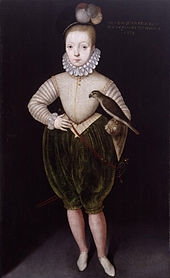 December 17 –1566 James (later styled James 6th), son of Queen Mary (Stewart) and King Darnley (Lennox Stewarts), was baptised “Charles James” on 17 December 1566 in a Catholic ceremony held at Stirling Castle. His godparents were Charles IX of France (represented by John, Count of Brienne), Elizabeth Queen of England (1st cousin twice removed, represented by the Earl of Bedford), and Emmanuel Philibert, Duke of Savoy ( an Italian Court speaking Duchy, also a cousin, represented by ambassador Philibert du Croc). Mary refused to let the Archbishop of Saint Andrews, whom she referred to as “a pocky priest”, spit in the child’s mouth, as was then the custom. The English guests were offended by the subsequent entertainment, which was devised by Frenchman Bastian Pagez and depicted them as satyrs with tails. As the eldest son and heir apparent of the monarch, the baby automatically became Duke of Rothesay and Prince and Great Steward of Scotland.
December 17 –1566 James (later styled James 6th), son of Queen Mary (Stewart) and King Darnley (Lennox Stewarts), was baptised “Charles James” on 17 December 1566 in a Catholic ceremony held at Stirling Castle. His godparents were Charles IX of France (represented by John, Count of Brienne), Elizabeth Queen of England (1st cousin twice removed, represented by the Earl of Bedford), and Emmanuel Philibert, Duke of Savoy ( an Italian Court speaking Duchy, also a cousin, represented by ambassador Philibert du Croc). Mary refused to let the Archbishop of Saint Andrews, whom she referred to as “a pocky priest”, spit in the child’s mouth, as was then the custom. The English guests were offended by the subsequent entertainment, which was devised by Frenchman Bastian Pagez and depicted them as satyrs with tails. As the eldest son and heir apparent of the monarch, the baby automatically became Duke of Rothesay and Prince and Great Steward of Scotland.
Portrait of James as a boy, after Arnold Bronckorst, 1574. James descended from the Welsh Tudor Royal line from both parents, who were cousins. Italian renaissance was in full bloom, bringing the arts and literature to Scotland, including the violin, which would be adopted and brought to the Scots settlements in the Carolinas a century and a half to two centuries later. The Earl of Gowrie, Ruthven, another cousin, would study at the University of Padua from about 1595 to 1599, about the time of Galileo’s appointment.
1582 RUTHVEN, WILLIAM, 4th Lord Ruthven and 1st Earl of Gowrie (1541?–1584), Provost and Lieutenant of Perth, Lord High Treasurer, at a convention of certain of the lords with the ministers of Edinburgh, Gowrie earnestly desired that he might be allowed to set Arran at liberty, ‘so that the good action had no hurt thereby,’ but it was determined that he should be retained in confinement (Calderwood, iii. 693). All that Gowrie would, however, agree to was that he should be kept in confinement until it was certainly known that Lennox had left the country (Bowes, Correspondence, p. 222).
1588 In “Sir Francis Drake: A Pictorial Biography” by Hans P. Kraus, a view of the financing for this expedition is provided. It shows funding provided by Queen Elizabeth (£16,000), Drake and other “adventurers” (£10,000 combined). The document, which is dated December 17, 1588, was saved by diarist John Evelyn, and is available for online viewing at the Library of Congress Rare Books Reading Room http://www.loc.gov/rr/rarebook/catalog/drake/drake-9-begoftheend.html.
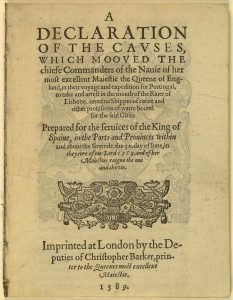 A Declaration of the Causes which moved the chiefe Commanders of the Nauie of her most excellent Maigstie the QUeene of England, in their voyage and expedition for Portingal, totake and arrest in the mouth of the River of Lisboune, certaine Shippes of corne and other provisions of warre bound for the said Citie; Prepared for the services of the King of Spaine, in the Ports and Provinces within and about the Souwnde, the 30 day of June, in the yeere of our Lord 1589 and of her Maiesties raigne the one and thirtie. Imprinted at London by the Deputes of Christopher Barker, printer to the Queenes most excellent Maiestie. 1589.
A Declaration of the Causes which moved the chiefe Commanders of the Nauie of her most excellent Maigstie the QUeene of England, in their voyage and expedition for Portingal, totake and arrest in the mouth of the River of Lisboune, certaine Shippes of corne and other provisions of warre bound for the said Citie; Prepared for the services of the King of Spaine, in the Ports and Provinces within and about the Souwnde, the 30 day of June, in the yeere of our Lord 1589 and of her Maiesties raigne the one and thirtie. Imprinted at London by the Deputes of Christopher Barker, printer to the Queenes most excellent Maiestie. 1589.
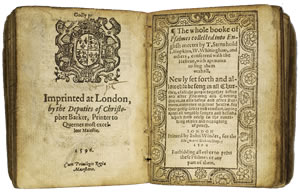 1596 Riot (King’s term) In Edinburgh. ‘The Sevintein dayes worke’ (James 6th’s words). Scottish clergy, who possessed a strong influence over the minds of the people, used it in public affairs. Freedom of Speech was claimed. The King wanted his orders declared from the pulpet. The clergy asserted they were not answerable to any civil court i.e. King’s court, for what they might say in their sermons, but only to the spiritual courts; that is, the Synods and General Assemblies of the Church, composed chiefly of other clergymen like themselves, and who, therefore, supported their freedom of speech. Inflamed by the violence of some of the sermons which they heard, the congregation broke out into tumult, and besieged the door of the Tolbooth, where James VI was sitting in the administration of justice, and threatened to break it open. The King was saved by the intervention of the better disposed part of the inhabitants, who rose in arms for his protection. [TG33-189] Attending the King in Tolbooth was John Lindsay of Balcarres, Lord Menmuir, Secretary of State, was attacked as a ‘plain mocker of religion’. Menmuir drew up the 55 points to be submitted to the general assembly which met at Perth on 28 February 1596 (2 months later and still the same year). John was second son of David Lindsay, 9th Earl of Crawford, by his wife Catherine Campbell, daughter of Sir John Campbell of Lorn. John had a kidney stone(s) which killed him within 18 months, by starving to death.
1596 Riot (King’s term) In Edinburgh. ‘The Sevintein dayes worke’ (James 6th’s words). Scottish clergy, who possessed a strong influence over the minds of the people, used it in public affairs. Freedom of Speech was claimed. The King wanted his orders declared from the pulpet. The clergy asserted they were not answerable to any civil court i.e. King’s court, for what they might say in their sermons, but only to the spiritual courts; that is, the Synods and General Assemblies of the Church, composed chiefly of other clergymen like themselves, and who, therefore, supported their freedom of speech. Inflamed by the violence of some of the sermons which they heard, the congregation broke out into tumult, and besieged the door of the Tolbooth, where James VI was sitting in the administration of justice, and threatened to break it open. The King was saved by the intervention of the better disposed part of the inhabitants, who rose in arms for his protection. [TG33-189] Attending the King in Tolbooth was John Lindsay of Balcarres, Lord Menmuir, Secretary of State, was attacked as a ‘plain mocker of religion’. Menmuir drew up the 55 points to be submitted to the general assembly which met at Perth on 28 February 1596 (2 months later and still the same year). John was second son of David Lindsay, 9th Earl of Crawford, by his wife Catherine Campbell, daughter of Sir John Campbell of Lorn. John had a kidney stone(s) which killed him within 18 months, by starving to death.
Imprinted at London by the Deputies of Christopher Barker, Printer to Queenes most excellent Maisetie. 1596 The whole booke.
1642 Declaration of Lex Talionis
1645 Siege of Hereford ended with the surrender of Royalist garrison. The Scots army under Alexander Leslie, First Earl of Leven, fought on the side of English Parliament because, Scotland was promised the right to practice Presbyterianism (John Knox Protestantism based on the a democratic congregation without bishops.) The soldiers were mercenaries, paid to fight and for taking home loot.
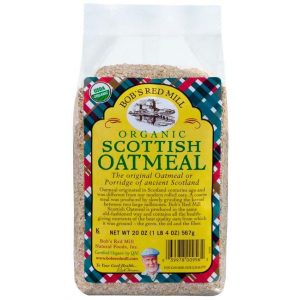 “The Scots marched with a very sorry equipage; every soldier carried a week’s provision of oatmeal, and they had a drove of cattel with them for their food.” (Oatmeal formed the mainstay of the Scottish diet. Wheat was not grown in Scotland and, unlike in England, bread was not in the diet. Scots would have porridge for breakfast and also eat oatcakes with most meals. The soldiers made a dough of oatmeal and water and baked this on hot stones from an open fire. Cavalry officers carried skillets. However, when the infantry soldiers were marching, no time for fire or boiling water, they would moisten the oats with milk or water and knead it in their hands to provide a paste.)
“The Scots marched with a very sorry equipage; every soldier carried a week’s provision of oatmeal, and they had a drove of cattel with them for their food.” (Oatmeal formed the mainstay of the Scottish diet. Wheat was not grown in Scotland and, unlike in England, bread was not in the diet. Scots would have porridge for breakfast and also eat oatcakes with most meals. The soldiers made a dough of oatmeal and water and baked this on hot stones from an open fire. Cavalry officers carried skillets. However, when the infantry soldiers were marching, no time for fire or boiling water, they would moisten the oats with milk or water and knead it in their hands to provide a paste.)
“The Scottish army hath a very able traine of artillerie, and many pretty engines for war, and devises for killing Cavaliers and Papists … never was a better disciplined Army in the Christian world than ours. We have no dangerous mutinies … but an universall cheerfulness in our whole body … never did Army make less spoile, commit less violence, fewer plunderings … Our Army is very hardy too, and can endure all heates and colds, and a small victailing will serve the turne; a little paste well kneaded in the palme of their hands is there usuall dyet, and they are not so tender as your English Cavaliers, who love ease, and eating, and carousing …”
“… Highlanders. These are not so civilized as we could wish, but they are good soldiers and hardy men, and are usually clad in a light plaid or speckled stuff, and in this attire they usually march, never using any armes upon their bodies. They have darts, and bows and arrowes, and durkes or great knives; and which is a wonder (for they are none of them very religious) yet they all hate bishops, papists, and cavaliers, and they threaten to pull them all to pieces, one limne from another.”
 Armies baggage train included hundreds of women and even children, called camp followers. These women nursed injured soldiers and cooked and washed for their menfolk. If the soldiers weren’t paid, then their own families would go hungry too. Committees were set up in areas the army had to pass to feed and supply the army, but the Earl of Leven complained to Parliament that his soldiers were not sufficiently provided for in Herefordshire. He also commented on the terrible state of the roads: ” … the Army is not able to march above eight miles a day, though they begin to march at the Sun rising, and continue till ten at night … the county is unwilling to afford us anything, and the committees give us no assistance.”
Armies baggage train included hundreds of women and even children, called camp followers. These women nursed injured soldiers and cooked and washed for their menfolk. If the soldiers weren’t paid, then their own families would go hungry too. Committees were set up in areas the army had to pass to feed and supply the army, but the Earl of Leven complained to Parliament that his soldiers were not sufficiently provided for in Herefordshire. He also commented on the terrible state of the roads: ” … the Army is not able to march above eight miles a day, though they begin to march at the Sun rising, and continue till ten at night … the county is unwilling to afford us anything, and the committees give us no assistance.”
1663 Andrew Millar 4th (our uncle) in Dailly on 17 December 1663. Andrew 4th compounded his offence by baptizing the child of a neighboring minister, and was fined 4,000 marks—-but he got the penalty reduced by half.
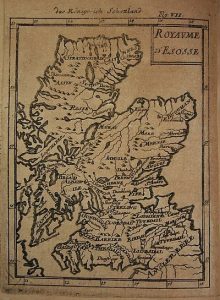 During the years when Andrew 4th was deprived, Nisbet indicates that Millar survived on the proceeds of sales of the lands that were his as the descendant of the eldest son in the family, and the Index to the Register of Deeds in the Register House at Edinburgh mentions him in a series of transactions between 1663 and 1669.
During the years when Andrew 4th was deprived, Nisbet indicates that Millar survived on the proceeds of sales of the lands that were his as the descendant of the eldest son in the family, and the Index to the Register of Deeds in the Register House at Edinburgh mentions him in a series of transactions between 1663 and 1669.
In 1669 and 1672, previous ousters of ministers were rescinded; in 1672 Andrew Millar 4th was once again given a charge, this time at Neilston, northeast of Paisley. YYMA 55. The Privy Council’s recommendation that named ministers ‘outed’ since the year 1661 be allowed to resume their functions was based on a review of the results of the prohibition of field and house conventicles and declaration that all who ‘preach, pray and exercise the other functions of ministers’ at such gatherings were rebels liable to be put to the horn, with their movable gear and goods escheated to His Majesty’s (Charles 2nd) use.
‘Considering the disorders which have latly bein by the frequent and numerous conventicles,’ they announced themselves ‘willing to remeid so great ane evill in the gentlest maner could be thought on.’
Not only Andrew Millar IV but his brother Robert Millar (1st) were restored under this decision. Map of Scotland 1685.
Das Konigreich Schottland, Royavme d’Esosse. Strathinayerin Caithness, Sutherland, Rosse, Muray, Marr, Merne, Loquhaber, Athole, Angus, Broad Alfair, Cantyr, Guningham, Karrine, Kile, Ayre, Gallou, Nythesmail, Dunfreys, Annandale, Lidasdal, AngleTrerre, Tiviedail, Marche, Lothetain, Tuvedail, Fife, Dundain, Abernathi, St Andro, Anguss, Perth, Bucuhan,
1688 James II returned to London and he was effectively the prisoner of William III.
1707 – ‘The presbytrie being informed of the pietie Literature and qualificationes of Mr. Robert Miller [II] Student of Divinitie within their bounds; and having also taken a proof of his Literature, and seen his testimonials according to the acts of the General Assemblie and being satusfied therewith in so far: Thought fitt to enter him upon tryalls, and appointed him Isai 45/24 surely in the Lord have I righteousness & strenght. For a homilie to be Delivered the next ordinary Presby Day.
1745 Prince [Charles] and army enter Penrith, Cumberland. (TG80-236) The rear guard was six miles in the rear. The Glengarry regiment of Highlanders were at that time in charge of the rear-guard; and at Shap, Lord George found Colonel Roy Stewart, with another small regiment of 200 men.
1752 Robert Millar (of Glasgow and Paisley from 1709) died. Author of the History of the Propagation of Christianity and other works illustrative of the scriptures and the history of the church.’ (Vol. VII, Renfrew and Argyle). The other works included a major History of the Church under the auld Testament from the Creation of the World, published in Edinburgh in 1730 and reprinted in eight volumes at Paisley in 1789.
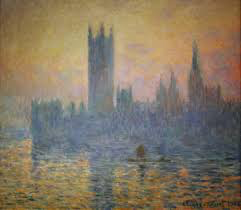 1783 London Parliament, House of Commons previously passed a bill regulating the East India Company. Rejected by the House of Lords. Fox’s ministry. Tytler’s Britannica 254.
1783 London Parliament, House of Commons previously passed a bill regulating the East India Company. Rejected by the House of Lords. Fox’s ministry. Tytler’s Britannica 254.
The Houses of Parliament Sunset by Claude Monet, about a century after the East India bill.
1809 Bonaparte divorced the empress Josephine. Tytler’s Britannica 268.
1812 Konigsberg. French army in retreat from Russia arrives, having lost 400,000 men, 41 generals, 1298 officers, 167000 privates, all artillery, baggage, captured by the Russians. Tytlen’s Britannica, 270.
1830 Joseph Smith the Prophet, at Fayette, New York. (clans Huntley, Hamilton, Mackenzie, Mack of Inverness, Malcolm King of Scots), Doctrine and Covenants 36. Sometime in December. Crying repentance, saying: Save yourselves from this untoward generation, and come forth out of the fire
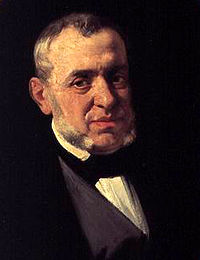 1870 Giusep pe Saverio Raffaele Mercadante (baptised 17 September 1795 – 17 December 1870) was an Italian composer of operas.
1870 Giusep pe Saverio Raffaele Mercadante (baptised 17 September 1795 – 17 December 1870) was an Italian composer of operas.
Saverio Mercadante in a portrait by Andrea Cefaly (Museo di San Martino, Naples). [Maria Stuarda, regina di Scozia, 1825]; Neidermeyer [Marie Stuart, Paris 1844]; Professor Alexander Weatherson in the 2009 Donizetti Society Newsletter wrote Scotland’s soil was a stream of operas of [Mary Stuart, Scotland might have been left in peace….In Italy alone in the earliest decades of the nineteenth century there was a Scotch broth of operas.
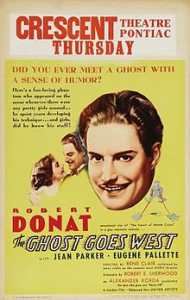 1935 The Ghost Goes West (1935) released. Historical comedy film opens with kilt and bagpipers forming for battle in 1746 against the English. Mudoch Glourie is exploded into limbo, as a coward, and doomed to haunt Glourie castle (castle from the 14th century, fireplace built 1558). Two centuries later a rich American buys the fictional Glourie Scottish castle, and dismantles it and moves it to Florida. Murdoch’s ghost moves too.
1935 The Ghost Goes West (1935) released. Historical comedy film opens with kilt and bagpipers forming for battle in 1746 against the English. Mudoch Glourie is exploded into limbo, as a coward, and doomed to haunt Glourie castle (castle from the 14th century, fireplace built 1558). Two centuries later a rich American buys the fictional Glourie Scottish castle, and dismantles it and moves it to Florida. Murdoch’s ghost moves too.
Poster. Voted the best British movie of 1936. To get eternal rest, Murdoc must get the enemy clan MacClaggan to admit one Glourie is worth 50 MacClaggans.
Comment; King James 2nd was blown up by firing the Lion Cannon in 1460 during the siege of Roxburgh Castle, held by the English. When Roxburgh castle fell, the Dowager Queen (Marie of Guelders James’ wideo) ordered the castle dismantled. Centuries later, Castles from Europe have been dismanteled and moved to Beverly Hills, California.
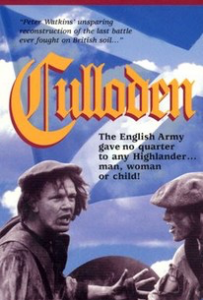 1964 Culloden filmed in Scotland. Portrays the 1746 Battle of Culloden that resulted in the British Army’s destruction of the Jacobite uprising and, in the words of the narrator, “tore apart forever the clan system of the Scottish Highlands”.
1964 Culloden filmed in Scotland. Portrays the 1746 Battle of Culloden that resulted in the British Army’s destruction of the Jacobite uprising and, in the words of the narrator, “tore apart forever the clan system of the Scottish Highlands”.
2001 Andrew Lee Choate born. (clans Ogilvie, Ross, Ruthven, Semple, Seton, Sinclair, Stewart, Summerville)
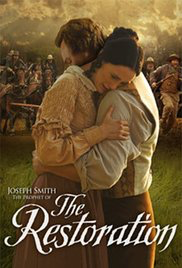 2005 Scotland the Brave is background theme music of Joseph Smith: The Prophet of the Restoration. Founder of The Church of Jesus Christ of Latter-day Saints. The movie is from the viewpoint of Lucy Mack Smith, mother of two apostles, grand mother and great grandmother of two more. Lucy descended from the Mack family of Inverness, Scotland. The first event is in 1813 when the bone in his left leg was seriously infected. Amputation was avoided by an experimental operation to remove the infected parts of the bone. The surgeon, Dr. Nathan Smith had studied medicine and surgery in Edinburgh Scotland. “Praise to the Man” (originally titled “Joseph Smith“) is a poem written as a tribute to Joseph Smith by Latter Day Saint leader and hymn writer William W. Phelps. The poem was composed soon after Smith’s death, and was later set to music and adopted as a hymn of The Church of Jesus Christ of Latter-day Saints (LDS Church). It was first published anonymously in the church newspaper Times and Seasons in August 1844, approximately one month after Smith was killed.[1] The hymn is still used within the LDS Church and is hymn number 27 in the current LDS Church hymnal.
2005 Scotland the Brave is background theme music of Joseph Smith: The Prophet of the Restoration. Founder of The Church of Jesus Christ of Latter-day Saints. The movie is from the viewpoint of Lucy Mack Smith, mother of two apostles, grand mother and great grandmother of two more. Lucy descended from the Mack family of Inverness, Scotland. The first event is in 1813 when the bone in his left leg was seriously infected. Amputation was avoided by an experimental operation to remove the infected parts of the bone. The surgeon, Dr. Nathan Smith had studied medicine and surgery in Edinburgh Scotland. “Praise to the Man” (originally titled “Joseph Smith“) is a poem written as a tribute to Joseph Smith by Latter Day Saint leader and hymn writer William W. Phelps. The poem was composed soon after Smith’s death, and was later set to music and adopted as a hymn of The Church of Jesus Christ of Latter-day Saints (LDS Church). It was first published anonymously in the church newspaper Times and Seasons in August 1844, approximately one month after Smith was killed.[1] The hymn is still used within the LDS Church and is hymn number 27 in the current LDS Church hymnal.
2015 The European Union Referendum Act 2015 (c. 36) is an Act of the Parliament of the United Kingdom to make provision for the holding of a referendum in the United Kingdom and Gibraltar no later than 31 December 2017 on whether the United Kingdom should remain a member of the European Union (EU) received royal assent. Brexit . Withdrawal of the United Kingdom from the European Union, or Brexit (a portmanteau of “British” and “exit” or “Britain” and “exit’’
Disclaimer: The author of each article published on this web site owns his or her own words. The opinions, beliefs and viewpoints expressed by the various authors and forum participants on this site do not necessarily reflect the opinions, beliefs and viewpoints of Utah Standard News or official policies of the USN and may actually reflect positions that USN actively opposes. No claim in public domain or fair use. © John Choate
Utah Standard News depends on the support of readers like you.
Good Journalism requires time, expertise, passion and money. We know you appreciate the coverage here. Please help us to continue as an alternative news website by becoming a subscriber or making a donation. To learn more about our subscription options or make a donation, click here.
To Advertise on UtahStandardNews.com, please contact us at: ed@utahstandardnews.com.


Comments - No Responses to “December 17th Scots Book of Days. A.D. 1566 James baptised.”
Sure is empty down here...